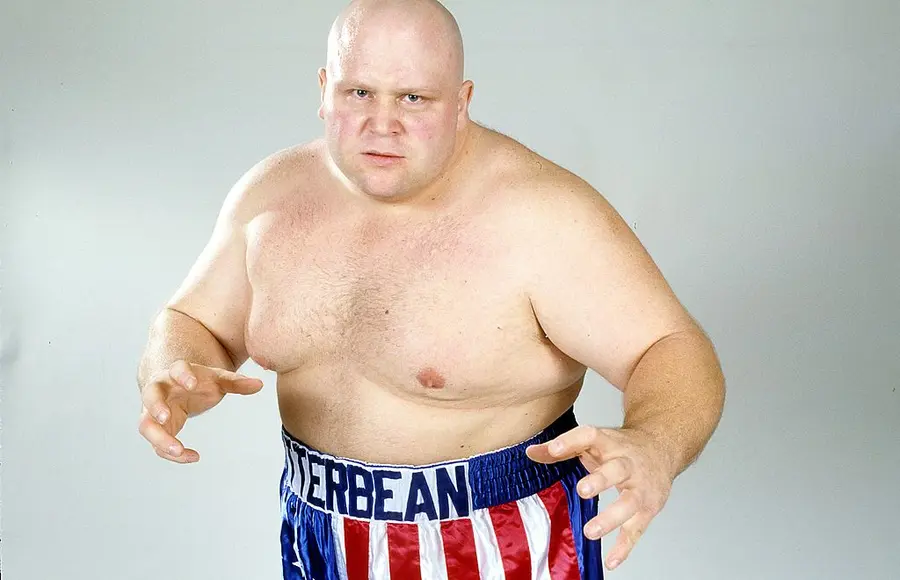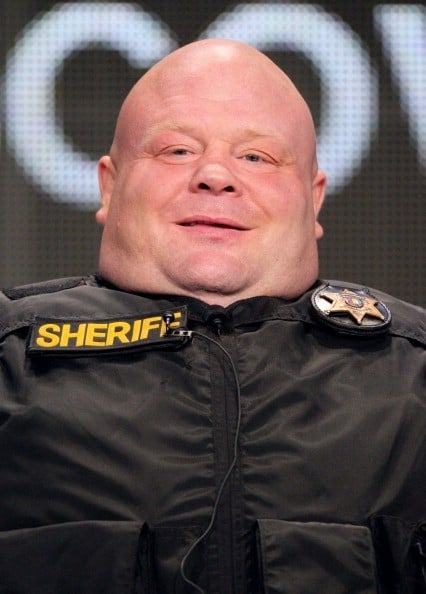What is Eric "Butterbean" Esch's net worth?
Eric "Butterbean" Esch is a retired American boxer, mixed martial artist, and kickboxer who has a net worth of $500 thousand. Butterbean is known for his unorthodox physique, knockout power, and charismatic presence across boxing, kickboxing, MMA, and professional wrestling. With his bald head, massive frame, and distinctive trunks, Butterbean became a cult favorite in the 1990s and 2000s, not just for his knockout punches but for his role as a fan-friendly showman. Over the course of his career, he amassed a professional boxing record of 77 wins (58 by knockout), 10 losses, and 4 draws. While never a conventional world champion, he earned the moniker "King of the 4-Rounders" and headlined cards across the world. Butterbean also gained fame through appearances in WWE, "Jackass: The Movie," and various reality TV programs, cementing his place in pop culture beyond combat sports.
Early Life
Eric Scott Esch was born on August 3, 1966, in Bay City, Michigan. He moved to Jasper, Alabama as a child and worked a variety of blue-collar jobs before finding his way into toughman contests, a popular grassroots fighting circuit in the South. Weighing over 400 pounds, Esch had no formal boxing background but developed a reputation for surprising agility and devastating punching power. He adopted the nickname "Butterbean" during his early fighting days as part of a diet-related bet with his coworkers, and the name stuck.

(Photo by The Ring Magazine via Getty Images)
Boxing Career
Butterbean's boxing career began in earnest after he won the Toughman World Championship. He turned professional in 1994 and was quickly marketed as a novelty act, often fighting in 4-round bouts rather than the standard 10 or 12. Despite this, Butterbean proved to be more than just a gimmick. He won the IBA World Super Heavyweight title in 1997 and defended it multiple times, primarily by knockout.
He became a staple of pay-per-view undercards and drew massive crowds thanks to his brawler style, colorful personality, and ability to end fights quickly. Some of his most memorable moments include knocking out Peter McNeeley (Mike Tyson's 1995 comeback opponent) and appearing on national broadcasts like HBO's boxing events. He closed his boxing career with a 77-10-4 record, earning widespread respect as an entertainer and crowd favorite.
Other Combat Sports
Esch's popularity led him to venture into other combat sports. He had moderate success in kickboxing and later fought in MMA promotions like Pride FC and K-1. In MMA, Butterbean compiled a 17-10-1 record. While he lacked grappling fundamentals, his striking power remained dangerous, especially against less experienced opponents. He notably defeated Zuluzinho in 2006 via knockout and appeared in several Japanese MMA events that capitalized on his fan appeal.
In professional wrestling, Butterbean made appearances in WWE (then WWF), most famously at WrestleMania XV in 1999. There, he knocked out wrestler Bart Gunn in 35 seconds in a legit shoot-fight segment called the "Brawl for All," effectively ending Gunn's push and Butterbean's brief WWE stint.

Frederick M. Brown/Getty Images
Media Appearances and Pop Culture
Butterbean was never confined to the ring. He achieved wider fame through a series of TV appearances, including a memorable scene in "Jackass: The Movie" (2002), where he brutally knocked out Johnny Knoxville in a department store. He was also featured in documentaries, guest shows, and even had his own short-lived reality series called "Big Law: Deputy Butterbean," which followed his stint as a reserve deputy in Alabama.
His approachable personality and underdog image resonated with fans who saw him as an everyman fighting among elite athletes.
Later Life
After retiring from active competition, Butterbean remained a public figure. He focused on health, eventually undergoing a major weight-loss transformation after years of struggling with diabetes and mobility issues. In interviews, he's spoken openly about the physical toll of his career and the importance of turning his life around after retirement. He also remained involved in law enforcement and motivational speaking.
Despite never holding a marquee world championship, Butterbean left an indelible mark on the world of combat sports. His career, spanning multiple fighting disciplines and entertainment platforms, made him a beloved icon to a generation of fans who tuned in just to see what he would do next.
/2015/08/butterbean.jpg)
/2020/06/John-Fury.jpg)
/2014/03/GettyImages-478263637.jpg)
/2019/01/Dillian-Whyte.jpg)
/2012/05/Frank-Bruno.jpg)
/2013/08/Bob-Sapp-pic.jpg)
/2009/09/Cristiano-Ronaldo.jpg)
/2019/04/rr.jpg)
/2020/02/Angelina-Jolie.png)
/2020/01/lopez3.jpg)
:strip_exif()/2015/09/GettyImages-476575299.jpg)
/2009/09/Jennifer-Aniston.jpg)
:strip_exif()/2009/09/P-Diddy.jpg)
/2018/03/GettyImages-821622848.jpg)
/2020/06/taylor.png)
/2017/02/GettyImages-528215436.jpg)
/2019/10/denzel-washington-1.jpg)
/2015/08/butterbean.jpg)
/2013/08/Bob-Sapp-pic.jpg)
/2014/03/GettyImages-478263637.jpg)
/2019/01/Dillian-Whyte.jpg)
/2014/09/GettyImages-2659801.jpg)
/2020/06/John-Fury.jpg)
/2021/05/rampage.jpg)
/2014/06/GettyImages-520029282.jpg)
/2019/11/GettyImages-1094653148.jpg)
/2009/11/George-Clooney.jpg)
/2020/04/Megan-Fox.jpg)
/2009/09/Brad-Pitt.jpg)